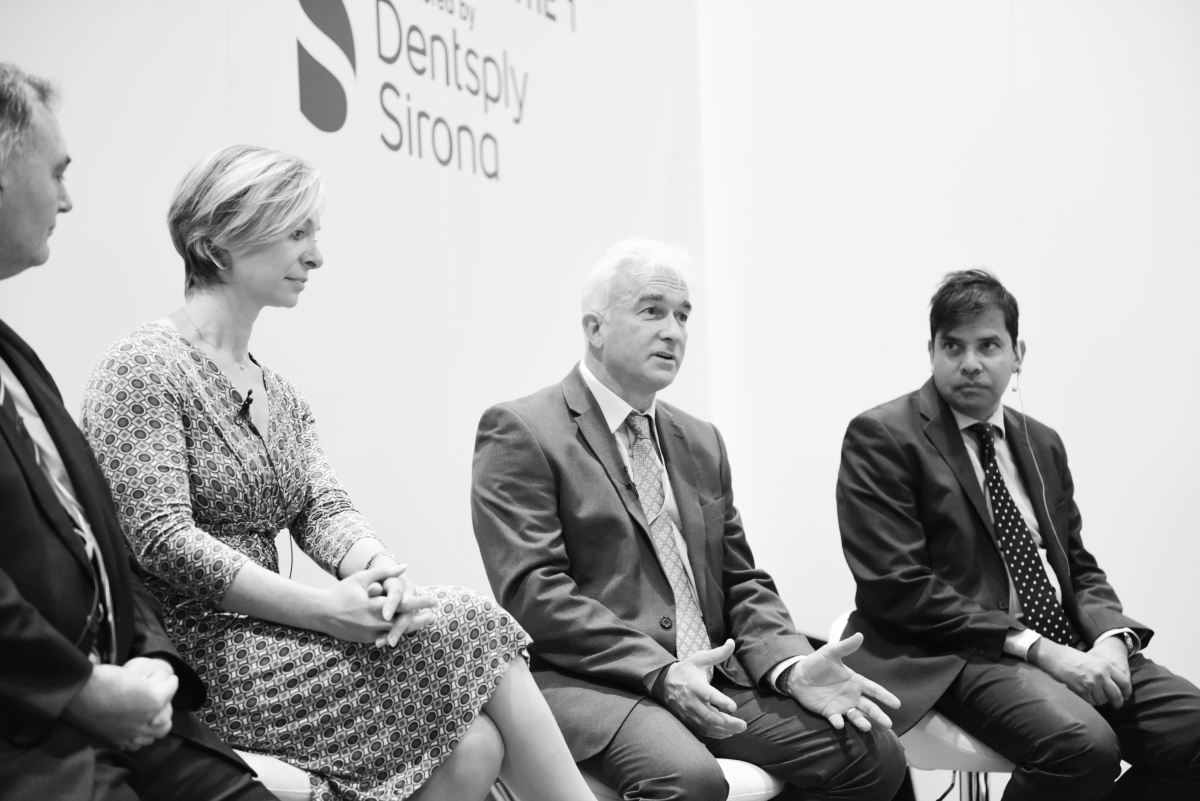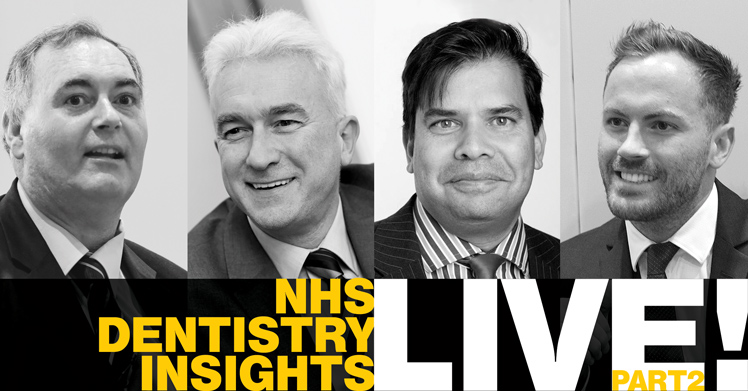During last year’s BDIA Showcase, Practice Plan organised a meeting of expert minds for two live events, firstly to facilitate discussion around the results of the fourth NHS Confidence Monitor and, secondly, to allow dental professionals in the audience to ask their burning questions about the possible future of NHS dentistry.
Practice Plan is now delighted to share the second instalment of the insightful and dynamic conversations that flowed between our valued participants at both events – David Bretton, a young associate dentist, Eddie Crouch, Len D’Cruz and Judith Husband, all wet-fingered dentists and BDA representatives, David Houston, principal of the Houston Group of practices, Tony Kilcoyne, a cosmetic dentistry specialist, Andrew Lockhart-Mirams, a solicitor, and Paul Worskett, the principal of a prototype blend B practice.
Offering essential insights
Over a period of 24 months, Practice Plan has commissioned a set of surveys – known as the NHS Confidence Monitor – asking dental professionals to rate their confidence levels in the future of NHS dentistry. The survey’s purpose was then to track these confidence levels, as information is released, about the NHS contract reforms, which has revealed confidence is low across the profession.

Each survey has been followed up with a meeting of key opinion leaders in the form of an Insights Panel to explore the results in greater depth. On this occasion, David [Houston] started the discussion by getting straight to the heart of the matter, commenting: ‘I think confidence is low because you cannot plan for or predict the future given the current contract and financial climate. Dentists may well be better off taking their future in their own hands by at least combining NHS and private work, if not trying to use their NHS access issues to guide people to the private sector using membership plans and more manageable ways of offering affordable dentistry beyond the Government’s control.’
‘I think confidence is low because you cannot plan for or predict the future given the current contract and financial climate.’ – David Houston
Considering the current state of NHS dentistry, Eddie stated: ‘The Department of Health is about to do a six-month review of what’s been going on in the prototypes. From what I understand, some are finding it difficult because there are three different elements that they’re trying to balance: patient numbers, activity and quality indicators. The worrying thing is that very few of the prototypes seem to be managing to keep their patient numbers high. Sadly, time and access don’t really match up. A lot of people participating in the prototypes are potentially facing a significant claw-back at the end of this year. Some of them are even thinking of pulling out before that happens, so the repercussions will be somewhat reduced.’
Continuing the discussion about claw-backs, Andrew said: ‘It’s certainly our experience that the flexibility that commissioners allowed a couple of years ago has fallen away. In minute terms, we’ve been dealing with a case where the contractor has been pursued vigorously by NHS England because they missed their target by 0.03%. That isn’t a confidence winner.’
There was also speculation as to when any revised NHS contract may come to fruition. Reflecting on this, David [Bretton] expressed frustration about the lack of clarity: ‘I don’t think the Government has a clue, to be honest, and if they have they are certainly not sharing. It’s as clear as mud.’
Looking for clarity
To try to decipher this ‘clear as mud’ outlook, an event complementary to the NHS Dentistry Insights Panel was facilitated to enable the audience to ask questions of our experts, which were ultimately posed to both our Insights and Burning Questions panels to provide clarity on the key issues and concerns facing dental professionals.

Interestingly, and very much welcomed, one member of the audience at this complementary session was Chief Dental Officer for England, Sara Hurley, who took the time to meet with the panel after the event and, we are happy to report, clearly recognised the relevance of the important points raised and commented on the quality of panel members’ individual contributions.
Why mixed practices matter
One of these issues raised was the future viability of mixed dental practice, and the panel was asked: ‘In light of the stagnation in NHS funding and the potential contract reform, how would you suggest a mixed practice (plan and NHS) evolve, when its sustainability is based on both NHS and private income streams?’
Len: I’m going to delve into the political aspect of this topic. The Government has lacked the courage or conviction to set out exactly what NHS dentistry offers. Added to this, they have made the lives of dentists very difficult because, every day, we walk the tight rope of Clause 59 in the NHS Contract Regulations 2005 that state the Contractor shall not, with a view to obtaining the agreement of a patient to undergo services privately, advise a patient that the services that are necessary in his or her case are not available from the Contractor under the Contract; or seek to mislead the patient about the quality of the services available under the Contract. This is pernicious because it means that even if a private option is demonstrably better than an NHS option, the clause implies dentists cannot say this. Yet with NHS funding flatlining and real-term incomes having dropped by 35% over the past 10 years, the only way an NHS practice is going to survive is through offering a mixed service.
‘The Government has lacked the courage or conviction to set out exactly what NHS dentistry offers.’ – Len D’Cruz
Eddie: In everyday terms, the sad truth is that it’s the cost subsidy from private patients that, at the moment, is keeping NHS practices safe and viable. If the trend of a very small uplift in dental pay and a Department of Health that is not really interested in making sure that dental practices are remunerated continues, then I would think that it would be a tipping point for people to decide that they cannot safely continue to cross-subsidise, and therefore something has to give. That, of course, would probably be the NHS provision.
David [Bretton]: Essentially, a lot of it comes down to a good marketing strategy. For example, treatment options not available on the NHS, as well as, perhaps, out of hours appointments for private patients offer NHS patients greater value, which may induce them to go private.
David [Houston]: I would like to think a mixed offering will be viable going forward. Practices have to maintain an open-door policy to all NHS patients in order to sustain the number of patients attending. However, once those patients are comfortable and ensconced within the practice environment, tactful, ethical selling should take place in order to encourage patient movement to the private sector, or at least to accept individual items of private care in order to give patients better choice, access to more advanced treatments and, potentially, to improve the practice’s profitability and the career development of the dental team.

Judith: I think that’s a sensible model, David [Houston]. I believe it is important to have multiple income streams within a business. Being entirely reliant upon one contract provider is potentially very dangerous. It’s really about assessing where the profit and loss is in the practice’s daily activities, being flexible about what you can offer treatment-wise in the face of a fixed NHS budget, and investing for the future.
Paul: I agree with both David and Judith on this point. NHS dentistry is being subsidised by Private treatment. If we look at the NHS budget in a bit more detail, my NHS contract value has risen by less than 1.5% per year over the last 5 years, while practice running costs have risen by about 5% per year over the same period. That’s a shortfall of 3.5%. Coincidentally, the BDA reports that dentists’ income has reduced by 3.5% per year (35% over the past 10 years). It is clear from the figures that the NHS is not paying its way and practitioners are making up the shortfall either from their own pockets or via private treatment. It is my belief that, for a practice to provide a truly comprehensive service to a high standard, it needs to offer private as well as NHS treatment.
Tony: I’d like to add that, without doubt, the current NHS dental contract for England is limited. It is now time to admit this in an open and transparent way publicly, so that the Government can be clear on what is and isn’t covered. So it may, perhaps, offer a great service for children and those in pain, as well as having an emphasis on prevention, but offer a restricted list for adults, allowing mixing as an additional service.
Phasing in time-limited contracts
The next question asked was: ‘How real is the prospect of time-limited contracts being introduced in this parliamentary term and what would be the impact?’
Eddie: I think time-limited contracts are definitely the future, but it won’t happen this term. The suggestion is that the Government hopes they will lead to efficiencies and savings without affecting quality, but I don’t see that. You only have to look at what they’ve done recently in procuring back-up services for the NHS, where they’ve awarded contracts purely based on price; that actually severely affects the quality of the care that can be provided.
‘Looking further down the line in terms of impact, I think time-limited contracts would have manifestly serious knock-on effects’ – David Houston
David [Houston]: Like Eddie, I don’t believe that they would be workable in this parliamentary term. My understanding is that every existing NHS contract would have to be reneg.otiated, and I do not believe the Department of Health could cope with that, nor would it be a priority for them. However, I am sure that the Government as a whole, looking to the future, would be very keen on time-limited contracts. I feel confident that the powers that be would see that as a way of making the pricing more competitive and more beneficial to government, and sadly less beneficial to the profession. Looking further down the line in terms of impact, I think time-limited contracts would have manifestly serious knock-on effects, because how could a principal secure funding from a bank over a 20 or 25 year period when all the practice has is a 5-year contract?
Judith: We do tend to think of time-limited contracts in terms of 5 years, David [Houston], but what if we were to start to explore the idea of 15-year contracts – or even longer. Then it becomes less destabilising, except in the last couple of years; there’s no way around that. With any contract offered, it is up to the individual practice to decide whether it is viable moving forward, and these are unique, commercial decisions based on the business plan and long-term strategy.

Paul: From my perspective, the impact would, on balance, be negative. Practices need to have stability to be able to make long-term plans and investments in their facilities – as David and Judith have said. This is not likely to be possible with time-limited contracts and would lead to more practices opting out of the NHS and going private, or selling out to the corporates. Goodwill values would drop and this would compromise owners of practices who have committed themselves to the NHS over many years.
Len: It is a fallacy to believe time-limited contracts will allow new entrants into the market place since the corporates, which can tender effectively and efficiently for the contracts, will win every time.
Tony: Absolutely. Time limited contracts can only create insecurity and reduce commitment to reinvestment and higher quality initiatives, unless they are for 10-plus years. With a limited NHS service, greater access can only be facilitated by additional contracts, not by stealing off Peter to pay Paul!
Offering a positive view to close the event, David [Bretton] said: ‘The profession probably needs to stay a bit more positive than we are doing. We’ve all got teeth and everyone’s going to need some sort of dental service at the end of the day. I think the other thing is, the profession needs to stick together and decide on a cohesive public message to disseminate. You have to spin it in the patients’ favour, so what about focusing on their safety and – everyone’s favourite – access?’
‘I think the other thing is, the profession needs to stick together and decide on a cohesive public message to disseminate.’ – David Bretton
Since these events were aired last year, we made contact with Chief Dental Officer England, Sara Hurley, for her comments on the event, to which she responded: ‘A lively and informative exchange of views, I wouldn’t expect any less from such an eminent group of practitioners. I was delighted to be present for the LIVE event at BDIA and, as I said on the day, I recognise many of the points shared on the current and future state of NHS Dental Service Provision. Paul, Len and Judith in particular offered balance and pragmatism; their perspective is highly valuable as we take the debate to the Department of Health. The role of the Office of the CDO is to be the advocate for our patients as well as the profession, and the points raised in the debates are useful insight and help us in articulating the profession’s viewpoint to both the Department of Health and NHS England. Thank you for facilitating such discussions.’
Thank you to Sara for her comments and to all our panel members. Meanwhile, at Practice Plan, we look forward to bringing further insight and discussions to the profession throughout 2017.
Read the first part of this panel discussion. For detailed results of the NHS Confidence Monitor surveys, as well as to gain access to the discussions from Practice Plan’s previous Insights Panel meetings and interviews with the panel members, click here.
[mc4wp_form]
